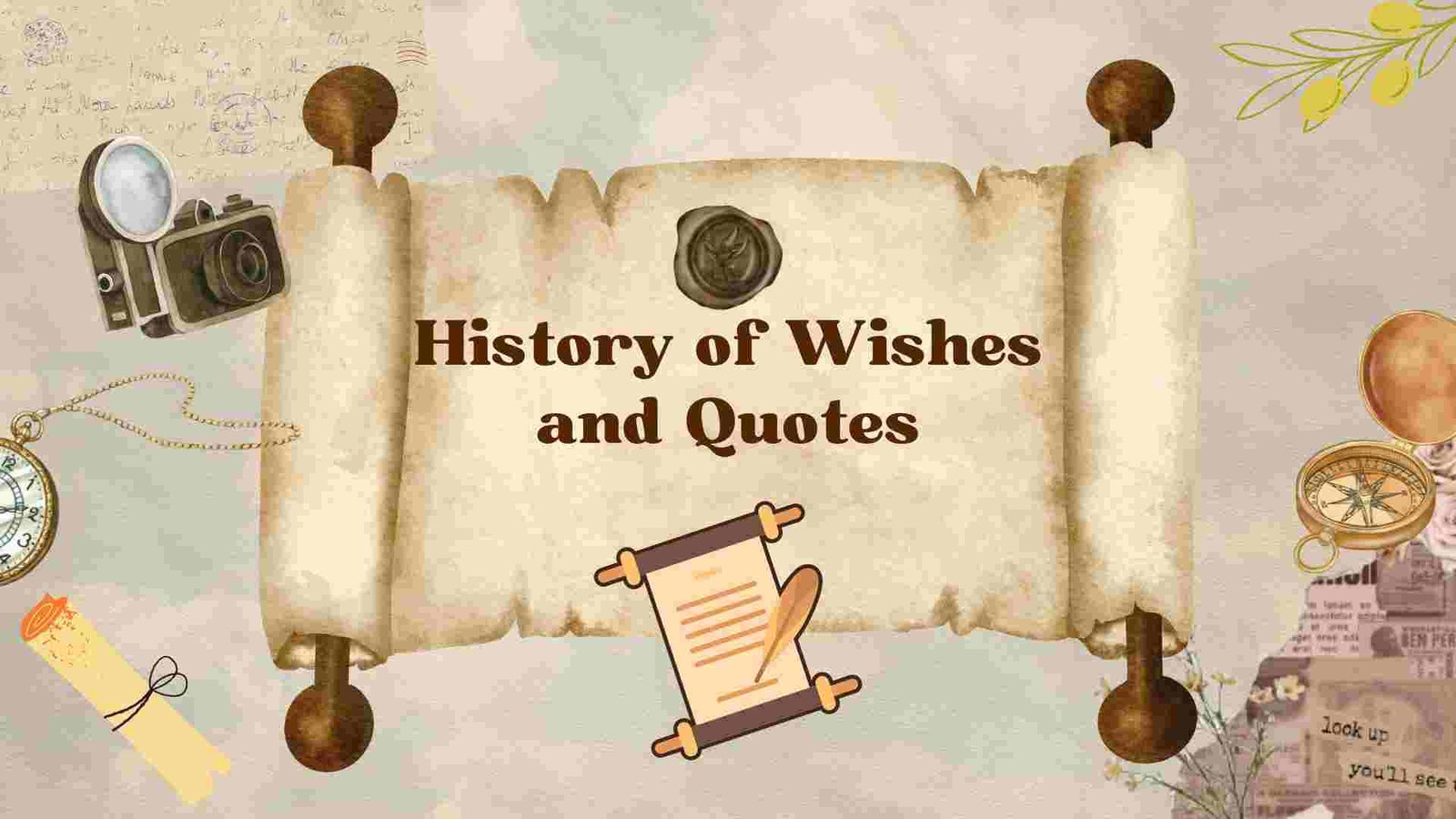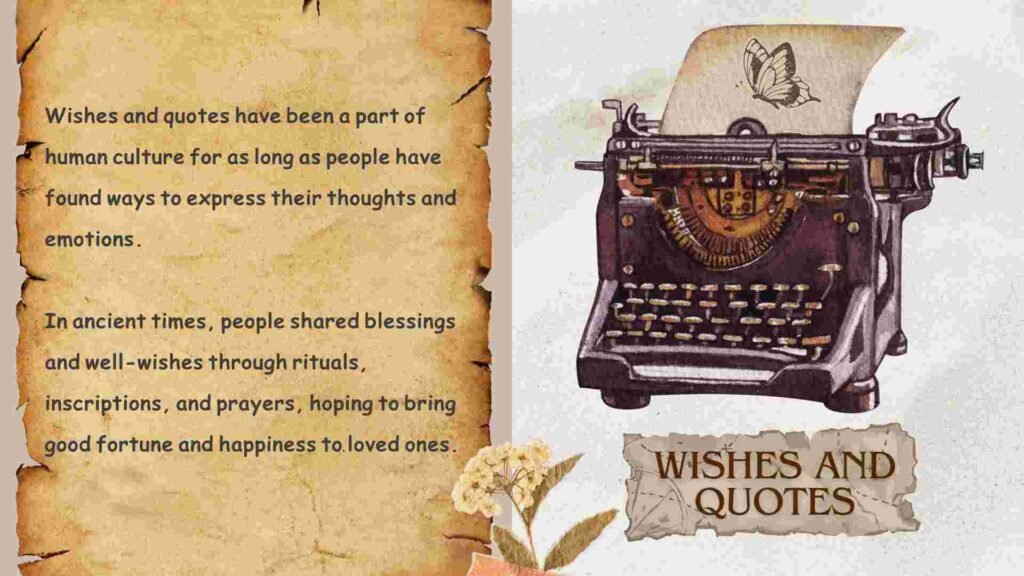History Of Quotes/Wishes
The Historical Background of Quotes/Wishes


The History Of Quotes/Wishes:
Here is the history of quotes/wishes:
The history of quotes and greetings is a fascinating journey that spans centuries, reflecting the evolution of human expression, cultural values and social interactions. Quotes—brief statements summarizing ideas, feelings, or philosophies—have been an integral part of human communication since ancient times. Similarly, well wishes, or expressions of goodwill, are seen in societies around the world, serving as timeless signs of care, compassion and positivity. Below is an in-depth exploration of the history of quotes and greetings, showing their origins, changes, and influence across cultures.
Origin of Quotes: Ancient Wisdom and Recorded Thoughts
The quotes we know today began as memorable sayings, often recorded in written texts or transmitted orally through generations.
Ancient civilizations like Mesopotamia, Egypt and China recorded the wisdom of their leaders, philosophers and poets. Texts such as the Epic of Gilgamesh, the Egyptian Pyramid Texts, and the Chinese “I Ching” are among the sources of the most ancient quotations still surviving today, which encapsulate timeless truths and existential contemplation. In the Greek and Roman times, great thinkers such as Socrates, Plato, and Aristotle provided wise statements in their works on topics such as ethics, governance, and personal happiness. Aristotle’s statement “The whole is greater than the sum of its parts” and Plato’s famous thought “The measure of a man is what his strength does” have been inspiring people for centuries.
Eastern philosophical quotes and teachings
In parallel with Western traditions, Eastern philosophy was also rich in quotations. Ancient Indian texts such as the Vedas and Upanishads contain deep thoughts on spirituality, morality, and human relationships. In Buddhism, quotations based on the life and teachings of Lord Buddha formed the core of his teachings. Similarly, in China, Confucius’s thoughts such as “It does not matter how slowly you go, as long as you do not stop” inspire countless people. These Eastern traditions developed quotes that prioritized virtues such as compassion, patience, and humility, thereby reflecting a collective value-system.
religious texts and proverbs
Religion has been one of the most influential sources of quotations. The Bible, Torah, Quran and other religious texts provide moral principles, messages of faith and solace in difficult times. Parts of the Bible such as “Proverbs” contain sayings such as “Pride goes before the fall”, which have had a profound influence on Western literature. In the Quran, quotes like “And hold fast to the rope of Allah, all of you together” (Quran 3:103) encourage unity against division.
From the Middle Ages to the Renaissance: Quotes in Philosophy and Literature
The prevalence of quotations in literature and philosophy increased during the Middle Ages and the Renaissance. During this period, life experiences were described in depth in the works of writers such as Dante, Chaucer and Shakespeare, who produced quotations that soon became popular. Shakespeare’s quotes like “To be or not to be” and “All the world’s a stage” are still known for their universality.
The Age of Enlightenment and the Rise of Individualism
The Age of Enlightenment brought about a significant change in quotations, emphasizing freedom and reason. Thinkers like Voltaire, Rousseau and Thomas Jefferson expressed views on liberty, equality and the rights of individuals. Jefferson’s statement “All people…” is an example of this idea.
Conclusion:
Studying the history of quotes and greetings acquaints us with the deep and rich heritage of humanity. In “History” it is possible to see how the human tendency to express thoughts and feelings concisely and effectively has evolved over the centuries. Greetings and quotes have been an integral part of cultural values, spiritual principles, and social interactions throughout history. From ancient times to modern times, different civilizations have incorporated greetings and quotes into the cornerstone of their societies in different forms.
In the history of ancient civilizations, whether it be Mesopotamia, Egypt, or China, the spread and transfer of knowledge in the form of “citations” has been an important aspect. These quotes not only inspired people’s lives, but they also reflected the rules, ideals and values of the society. Additionally, the history of religious texts is also an important part of the history of quotes, with scriptures such as the Bible, the Quran and the Vedas containing innumerable inspirational and life-instructional sayings. From time to time in history, such quotes and wishes have been making their important place in every aspect of human life.
The period from the Middle Ages to the Renaissance saw a proliferation of quotations in history, literature and philosophy. Philosophers and writers have turned to quotations to understand and express the complexities and conflicts of human life. During this historical period, writers such as Shakespeare, Chaucer, and Dante produced lines in their writings that later became famous as “quotes”. During this period of history, quotes played an important role in personal and social change.
Eastern traditions have also had a strong influence on quotes and greetings throughout history. Confucius, Buddha, and other Indian and Chinese philosophers taught their followers the truths of life through quotes. These quotes inspired people to adopt virtues such as compassion, tolerance, and humility, which have always been relevant in the history of humanity.
Quotations also gave rise to changes in the ideas of humanity in the history of the liberal era and the Enlightenment. This era promoted the values of individual freedom, equality, and reason. Quotes from Voltaire, Rousseau, and other philosophers became a source of inspiration for human rights and freedom. This was a turning point in history, where quotes and greetings were no longer limited to personal use, but became an inspiration for social change.
Ultimately, history teaches us that quotes and greetings are not just words, but they symbolize humanity’s thoughts, feelings, and cultural evolution. In every period of history, quotes have provided new perspectives to people and greetings have infused hope and positivity into their lives. Even in the modern age, these quotes and wishes are increasingly exchanged through social media, and this reflects the continuity of history. It is the influence of history that even today people share these at the individual and collective level, which provides them inspiration, solace and direction.
